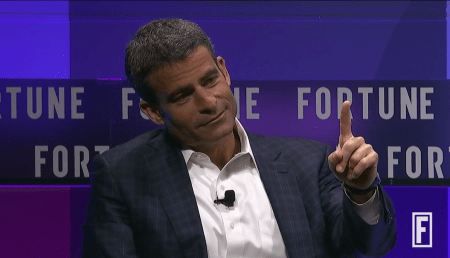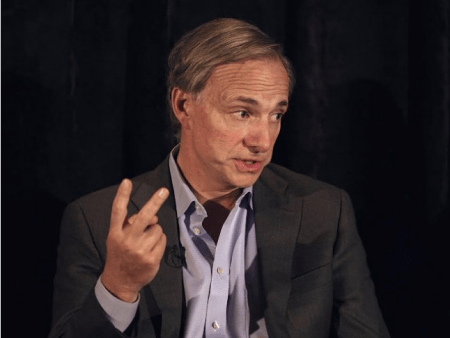There’s been a strong interest in meditation lately among stressed, high-powered Wall Street bankers, investors, and CEOs. Many extol the virtues of Transcendental Meditation, aka TM. One investor describes TM as “Low investment, High return.” Here are a few of the many articles in such leading publications as Fortune, Forbes, and Business Insider.
Fortune reports: This Banking CEO Swears by Meditation. Barry Sommers (J.P. Morgan) has been doing Transcendental Meditation twice a day for the last ten years. He says he saw major positive changes in a longtime friend and colleague. Sommers then learned about TM from Bob Roth, CEO of the David Lynch Foundation. Watch this dynamic video clip from Fortune’s second annual Brainstorm Health conference, moderated by Arianna Huffington. It’s embedded in this Fortune article: Why America’s Top Bosses Love Sleep and Meditation, part of which is excerpted here:

CEO Barry Sommers praises TM at Fortune’s Brainstorm Health conference
Some corners of corporate America have long had a culture that wears its long and grueling hours like a badge of honor. Now a group of executives is trying to change that by opening up about how they each found balance in their own lives and by making wellness a priority at their companies.
“I’ve found in a culture like Wall Street, people are obsessed with how many hours people work,” said Barry Sommers, CEO of Wealth Management at J.P. Morgan Chase, during Fortune’s second annual Brainstorm Health conference in San Diego on Tuesday. “Way too many people are getting out of there as fast as they can because they’re totally burnt out.”
Sommers decided to take his health into his own hands a decade ago after someone he’d known personally and professionally for 30 years started doing Transcendental Meditation. “It transformed this person’s life,” he said. “I saw a different person.”
Sommers has now been doing Transcendental Meditation 20 minutes two times a day for a decade. And he prioritizes sleep, getting seven and half to eight hours every night. “I changed my schedule and lifestyle,” he said. “When I do a dinner, we’ll be at the restaurant at 5pm, not at 8pm.” He said his kids make fun of it, but he wakes up every morning “incredibly happy.” If there’s a problem at the office, his employees know to call the house and his wife will wake him up. But rarely is there anything so important that it can’t wait until the morning, he said.
“This goes completely against mainstream assumption that J.P. Morgan is the boiler room of burnout,” said Arianna Huffington, the founder and CEO of Thrive Global, who moderated the panel.
Forbes, France also covered this topic: Transcendental Meditation: The Secret Weapon of Leaders, which includes this embedded video of Ken Gunsberger, from the Center for Leadership Performance.

Ken Gunsberger, VP, UBS Wealth Management New York, doing his TM
Writer Catherine Nivez interviewed Wall Street investor and TM meditator Ken Gunsberger who refers to TM as “Low investment, High return.” Vice President of UBS Wealth Management in New York, Kenneth Gunsberger manages his clients’ fortunes, market competition and professional stress. Leonard Stein, TM Teacher representing DLF in Geneva, is also quoted extensively in this excellent article.
In the video, Ken expresses a concern to his NY TM instructor: “How am I gonna know when I’m “in the zone” when I’m meditating? The reply he was given: “You’re not. The goal is to not be in the zone when you’re meditating. The goal is to be in the zone when you’re done. When you’re in that meeting at work. When you’re with your kids. When you’re with your spouse. That’s when you wanna be in the zone.”
Ken adds: “And because of the TM it has enabled me to do a much better job all across the board.” Ken said TM “literally changed my life.” After meditating only two and a half months his business increased; he had the best month in twenty-five years. Even his relationship with his daughter improved. He sums up the results of his TM practice this way: “Better choices. Better allocation of energy. Better results.”
Click on the link to watch to the rest of the video. Click the title to read the article. If you don’t understand French, use Google Translate. It’s worth the effort.
Business Insider has written before about TM in Business. Recently, Richard Feloni wrote a comprehensive report: Transcendental Meditation, which Bridgewater’s Ray Dalio calls ‘the single biggest influence’ on his life, is taking over Wall Street. It was republished in many places, including SFGATE. Here is an excerpt:

Ray Dalio, Founder, Bridgewater Associates, world’s largest hedge fund
Around eight years ago, Bridgewater Associates founder Ray Dalio introduced Transcendental Meditation to his then—735 employees.
Dalio had already established a unique, intense culture at Bridgewater that he likes to say is akin to being part of an ” intellectual Navy SEALs ,” and he believed that Transcendental Meditation (TM) would work as an effective counterbalance.
“I did it because it’s the greatest gift I could give anyone—it brings about equanimity, creativity and peace,” Dalio told me via email.
Since then, TM has popped into the mainstream, and over the last three years, the David Lynch Foundation TM center has taught almost 2,500 professionals, with roughly 55% of those from Wall Street, and 1,150 of those in 2016 alone.
Read the rest of this fabulous article—Transcendental Meditation, which Bridgewater’s Ray Dalio calls ‘the single biggest influence’ on his life, is taking over Wall Street—one of the best yet, and other TM articles archived on their website.
Note: I gave Jochen Uebel permission to translate this post into German: Prominente Business-Zeitschriften berichten über Transzendentale Meditation (Prominent business magazines report on Transcendental Meditation).